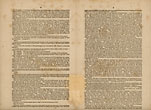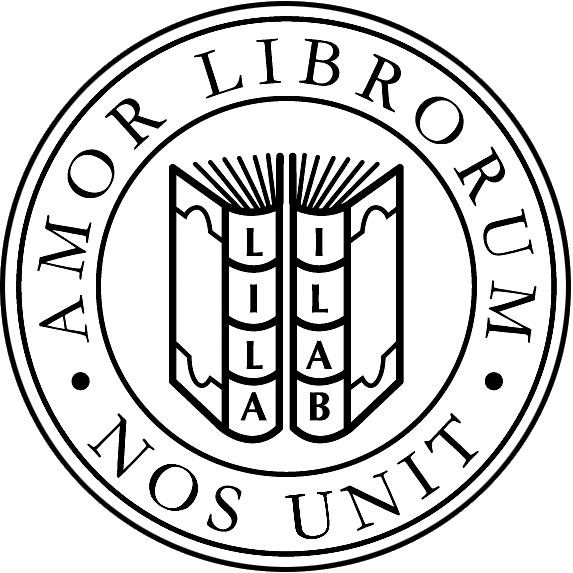Dealer in Rare and First-Edition Books: Western Americana; Mystery, Detective, and Espionage Fiction
The Slavery Question. Speech Of Hon. L. Q. C. Lamar, Of Miss.[Issippi], In The House Of Representatives, February 21, 1860
HONORABLE L. Q. C. LAMAR
Other works by HONORABLE L. Q. C. LAMARPublication: Government Printing Office, 1860, Washington
First edition. 8vo. Uncut printed wrappers, 8 pp. L.Q.C. Lamar is perhaps Mississippi's most noted 19th century statesman. He was the first person, and one of only two in American history to serve in the U.S. House of Representatives, the U.S. Senate, as a member of the President’s Cabinet, and as a justice on the U.S. Supreme Court. Despite these accomplishments, Lamar's legacy is tainted today by his active role in the reestablishment of white supremacy in the post-Reconstruction South. Lamar's speech at the House of Representatives states that, "Mississippi stands here today, and finds slavery, through the action of this Federal Government, an integral and live-element in her social system, interfused with the social relations, the industrial pursuits, the investments of capital, and the political forms of her people." Furthermore he states that, "the calamity of the times is, that the people of the North do not understand the people of the South; and it is to the interest of a certain class of politicians to perpetuate the misunderstanding." "The gentleman from Connecticut, sir, in his speech a few days since, repeated the assertion of the gentleman from Ohio, [Mr. Corwin,] that it was the policy of the founders of our Republic to prevent the establishment of slavery in new communities .... My own State is a standing refutation of the proposition. Sir, slavery exists this day in Mississippi by the encouragement ... certainly with the consent ... of this Federal Government when it was in the hands of the founders of our Republic. By the act of 1798 the President was authorized to extend over the Mississippi Territory the same Government which existed northwest of the Ohio, excepting the last clause of the famous ordinance prohibiting slavery; and that was repealed. And upon the motion of Mr. Thatcher, of Massachusetts, to protect what he called "the rights of man," the Wilmot-proviso principle was proposed to be extended over Mississippi, and received at first but twelve votes, and upon the last proposition but one vote. Now, sir, this seems to me to be a legislative declaration to exclude the conclusion that there was any desire upon the part of the founders of our Republic to prevent the establishment of slavery in new communities." Lamar goes on to discuss slavery as it pertains to the Gospel .... "The duty of slaves is also explicitly made known in the Bible. They are bound to obedience, fidelity, submission, and respect to their masters, not only to the good and kind, but also to the unkind and froward; not, however, on the ground of duty to man, but on the ground of duty to God." "Was there not an express permission given to Israel to buy and hold slaves as of old?" My point is, that the principle with which you are warring upon us, is condemned by the ordinance of God and the language of Scripture. I say that God would never, even 'for local and temporary purposes,' have given permission for that which comes in conflict with those immutable principles of natural right of which he is the author. When he established slavery among the Jews, he established the principle that there may be conditions and circumstances under which slavery is not "hateful to God or unjust to man." ".. the difference between the legislation of northern and southern States upon the subject of slavery, is, that the negroes are not sufficient in numbers at the North to make it necessary to reduce them to the condition of domestic servitude, while with us that condition is indispensable to the good order and welfare of the whole society ..... the negro in the southern States has reached a moral and intellectual development superior to his race in any other position in which he has been placed. That he contributes more, in his present condition, to the good of mankind, their moral and intellectual progress, than in any other position in which he has been placed. What was his condition when he was first brought here? Look at him upon his native continent. The most humane explorers of the African continent tell us that they exist there without social or political order, without modesty or shame, some of the tribes not even reaching the civilization of the fig-leaf ... If, then, we show that the condition of the negro at the South is superior to his condition in any other country, and that the abolition of slavery has always been followed by immediate retrogression, I ask of what has humanity to complain against the institution? ... Look at labor as it exists at the North ... the mighty North ... the seat of commerce, manufactures, mechanic arts, accumulated wealth, and common schools. Look at the mighty population that fills that vast territory with the hum of its free industry..... Sir, our negroes are working under, and for your free laborers at the North. They furnish them with the raw material on which this free labor exercises its skill and industry; the raw material which is the very basis of your commerce and manufacturing enterprise." The speech concludes with, "We ask only our constitutional rights in the Union. The southern people demand that this organized "irrepressible conflict" shall stop ... that the institution of slavery shall be maintained as an existing fact in this Confederacy." Like most Southern politicians of his time, L.Q.C. Lamar was a firm supporter of states' rights and slavery. Convinced that the South's position was proper and constitutional, he resigned from Congress in January 1861 and returned to Mississippi where he wrote the official Mississippi Ordinance of Secession. Lightly soiled and tanned with some splitting a folds along with chipping and wear to extremities.
Inventory Number: 47338Sold -- Contact us
![The Slavery Question. Speech Of Hon. L. Q. C. Lamar, Of Miss.[Issippi], In The House Of Representatives, February 21, 1860 HONORABLE L. Q. C. LAMAR](/media/images/large/47338.jpg)











